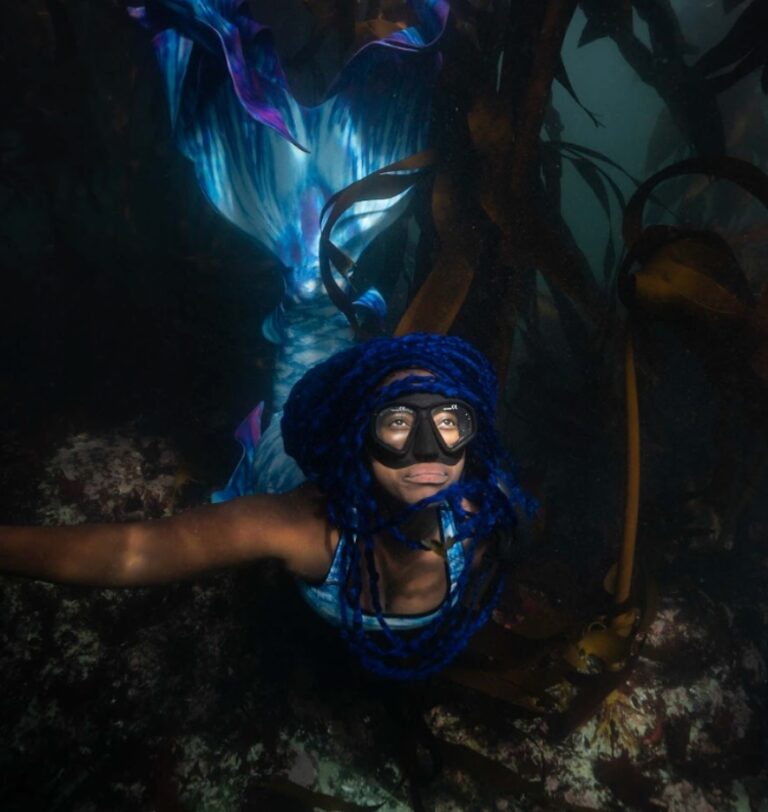ZANDILE NDHLOVU, South Africa’s first black female freediving instructor, is on a mission to spread the good word about the ocean among people who haven’t had her opportunities. She talks to Steve Weinman
Zandile Ndhlovu’s home is Cape Town now, but she grew up far from the ocean, in the township of Soweto near Johannesburg. Had the big blue intrigued her as a child?
“No, I didn’t even know it existed,” says South Africa’s first black female freediving instructor, today an influencer making strides in introducing others like herself to the ocean. “We didn’t grow up with access to those worlds and so, when I saw the the sea for the first time, it was the most incredible moment.
“There was a feeling of awe. Little did I know that beyond the crashing waves was life, in all the ways I could never have imagined.”
Zandile (her name is pronounced Zan-DEE-lay And-LO-vu) did learn to swim in a pool when she was 11, but it would be another 17 years before she ventured beneath the ocean waves for the first time. “I was going through a hard time when I ended up in Bali. One morning heading to breakfast I heard about a snorkel trip and signed up.
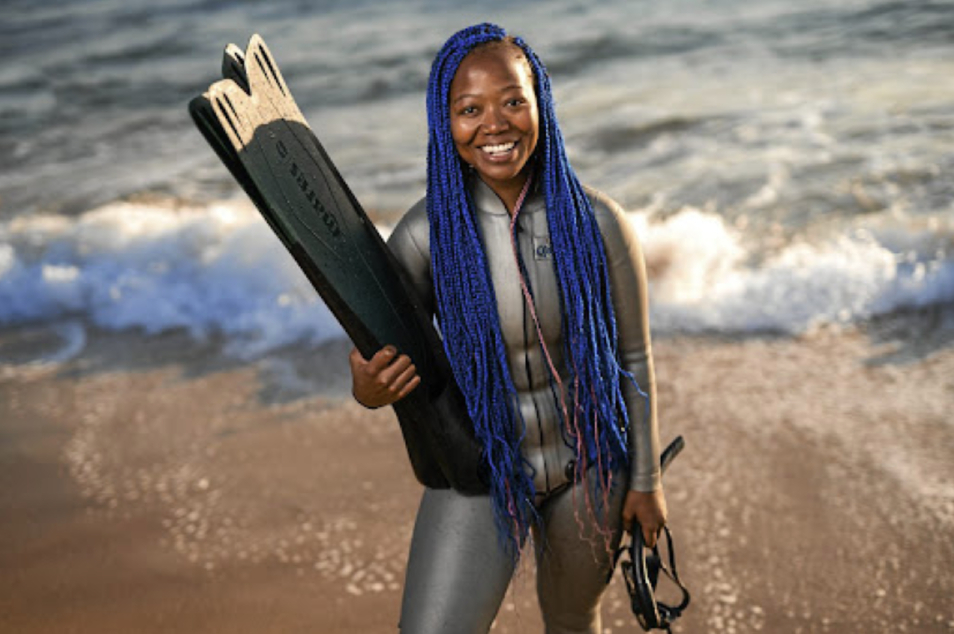
“It was absolutely incredible. The colours were so rich, and I’ll never forget how mind-blowing the blue of the water was, and the beautiful honeycomb moray that made its way through the reef, with the bottom of the ocean looking like it was lit up from beneath. It really was the most beautiful world I had ever seen.”
What happens next? she asked afterwards, and everyone told her – scuba, of course!
“That’s how the journey started, with a Discover Scuba in Sodwana Bay, a beautiful Marine Protected Area in South Africa. Awed by physically being able to breathe under water and knowing I wanted more, I enrolled for my PADI Open Water, then Advanced course, and quite a few certificates after that.”
People-facing
Zandile’s career was still in Johannesburg, where she had started working in customer relations, then key account management before moving, after further studies, into diversity and inclusion work inspired by difficulties encountered in the corporate world.
Accustomed to working in people-facing environments, she decided to become a scuba instructor, but says it wasn’t exactly easy being “the only black person on the boat”.
“Of course, it can be hard being different, being the ‘outsider’, especially in South Africa, a place where water may well be political.
“So it went from language that wasn’t inclusive on courses and dives, to comments about my hair, insinuating the normative being only whiteness, and wetsuits that held my bottom half and not my top half, making dives not the most comfortable. That time definitely had its challenges.”
Then Zandile discovered freediving. “In the scuba-diving years I knew that something was missing, and when I saw these girls diving without tanks I just knew I had to go on the course.
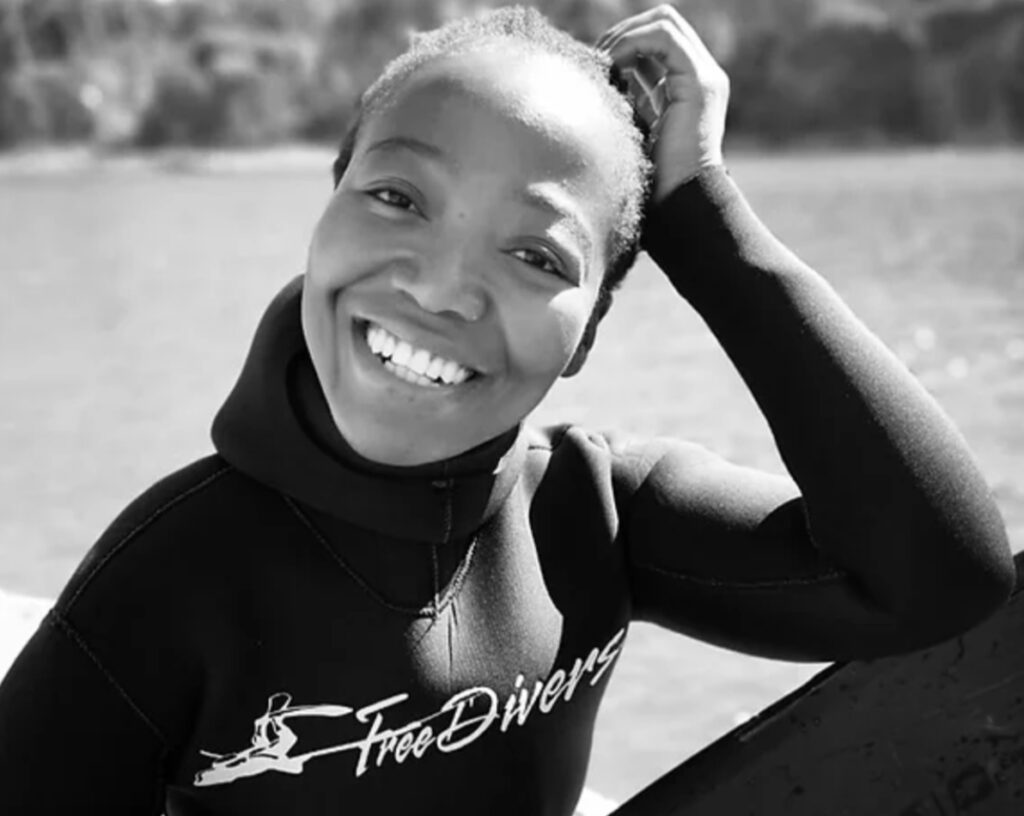
“I’d fallen in love with breath-hold, and from the moment I held my breath under water I knew I wanted to teach, to live in this world. It changed everything and, of course, that meant getting to instructor level.
“Freediving was still largely undiverse – but it was a softer landing. Here, the challenge was only facing my fears to go deeper. It was a really powerful and transformative time for me.”
Aside from standard initial concerns about “running out of air and swallowing the ocean“, she says the training was barely a challenge at all. “There’s a beauty in the discomfort of your body wanting to breathe while you don’t, and learning to take back control from the auto-run systems of the body.
“It’s the most beautiful world – after the freak-out of contractions, darkness, depth and all the things your mind will conjure up in those minutes of not breathing, of course.”
‘100% freaked out’
Not everyone was as thrilled by Zandile’s new direction, and she describes her family as having been “100% freaked out” by it. “My friends were asking why I do ‘white people things’, my consultancy wanted to know when I would be back at work, old clients were mentioning that ‘I’d made my point with the mermaid thing and to come back’.
“I’m certain I made a few people uncomfortable, but for me it was just the beginning of the beauty of finding my true home and pursuing it with all I had.
“While I was on scuba, I’d enjoyed the water and the exploration but realised I didn’t want to teach it. But when I moved to freediving there was a clear knowing that I not only wanted to teach but to tell everyone who would listen about the beauty of our oceans.
“It was like something inside of me had opened up… and the moment I got my certification, I knew I didn’t want to work in a dive-shop but actively wanted to create access for the communities from which I come.
“It’s not easy to explore the ocean and it can be costly, especially for those coming from a previously marginalised community. I not only wanted to lower the barrier to entry, but dreamt of a different future that was more racially diverse than the world I existed in. I then went on to pursue this big dream.”
After working for a time as a freelance breath-hold instructor in Cape Town, Zandile put this on hold as her ambitions expanded. In 2020 she founded, part-financed and started running the Black Mermaid Foundation, with the aim of creating diverse representation whether in ocean sports, careers or recreation.
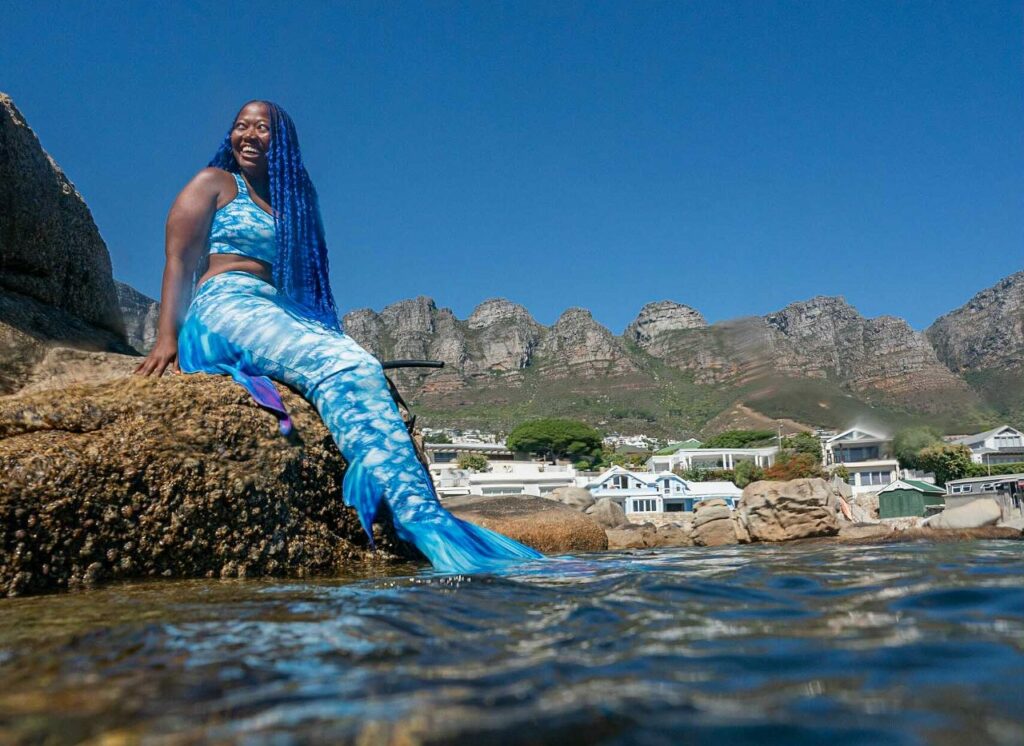
A black mermaid tradition has existed since ancient times in southern, west and central Africa and was preserved in the Afro-American diaspora. It revolves around Mami Wata, a half-human, half-fish spirit said to embody the sacred nature of water.
Unlike siren-style European mermaids luring seafarers to their doom, Mami Wata was regarded as a powerful maternal deity.
Initially Zandile taught members of a community group in the township of Langa in Cape Town how to swim, snorkel and appreciate the wonders of the ocean, the importance of conservation and how human actions on land could affect the marine ecosystem.
But she wanted to set up a whole series of “ocean hubs” to improve open-water access especially for young people from under-privileged backgrounds. Now her efforts appear to be gathering pace.
“We’re lucky to have finally made headway with a potential partner,” she tells me. “We had battled a while with getting land to place our container / hub space, which was donated to us by 11th Hour Racing.”
This US charity works to mobilise sports, maritime and coastal communities to inspire solutions for the ocean, promoting change through sponsorships, grantees and ambassadors.
“It’s definitely going to be not only a game-changer for us, but will lean heavily on the beauty of partnerships, co-creation and resource-sharing in ocean conservation spaces,” says Zandile. “We’re excited to see an even deeper impact on communities that have minimal access to the ocean. It’s 100% my main pursuit right now.”
Ocean champions
Awareness is growing in South Africa about issues such as ocean warming, plastics pollution and shark welfare, says the blue-haired campaigner. “We are seeing more and more young people show up in the advocacy work, but also seeing ocean-facing content and art become more accessible to the public, such as in work by incredible photographers.
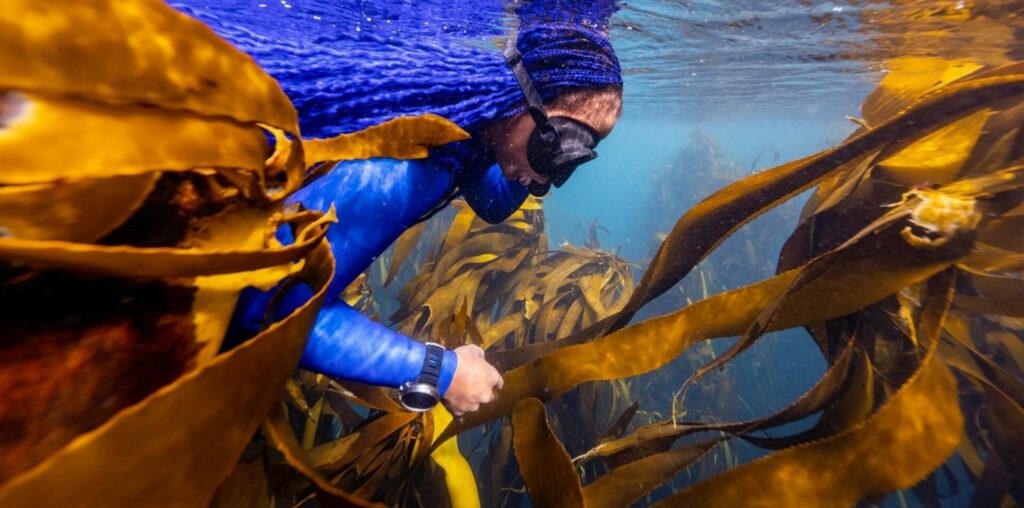
“We have a way to go but I’m confident we are already writing a future that is not only inclusive but has a diverse group of guardians and ocean champions. We can only win from here.”
As the work has picked up globally, Zandile has found less time to spend in the water recreationally – and in South Africa. “When I am home, I focus on sunset or sunrise swims or freedives because these are quick and easy to access from where I live. So I live for these moments of silence with the ocean, or sharing laughs with friends in this most beautiful space.”
Favourite places to dive? She names first the “warm waters that are full of surprises” in Sodwana Bay. “You can come across absolutely anything here, from mantas to great white sharks,” she says.
Also up there is Aliwal Shoal – “this tough-launch beauty that is home to some of the biggest bull shark populations” – and Cape Town: “Her kelp forests never get old, it’s like a magical fairyland… these are also my local waters and I’m so lucky to call it home.”
Beyond South African shores, however, lies Zandile’s growing bucket-list: “This year I hope to spend some time freediving training in Egypt; I hope to see sperm whales in the Dominican Republic and to do more dives with tiger sharks in Hawaii or Bermuda, but essentially it’s just about continued exploration.
“There’s something about meeting strangers on boats around the world and hearing their stories that grows your heart and piques your curiosity.”
High-profile challenges
Named one of the Global Top 100 Most Influential People Of African Descent in 2022, Zandile also became a PADI AmbassaDiver that year, promising “to keep showing up for the ocean, advocating for her protection in all the ways we can while encouraging people to explore our beautiful oceans through the lens of my camera”.
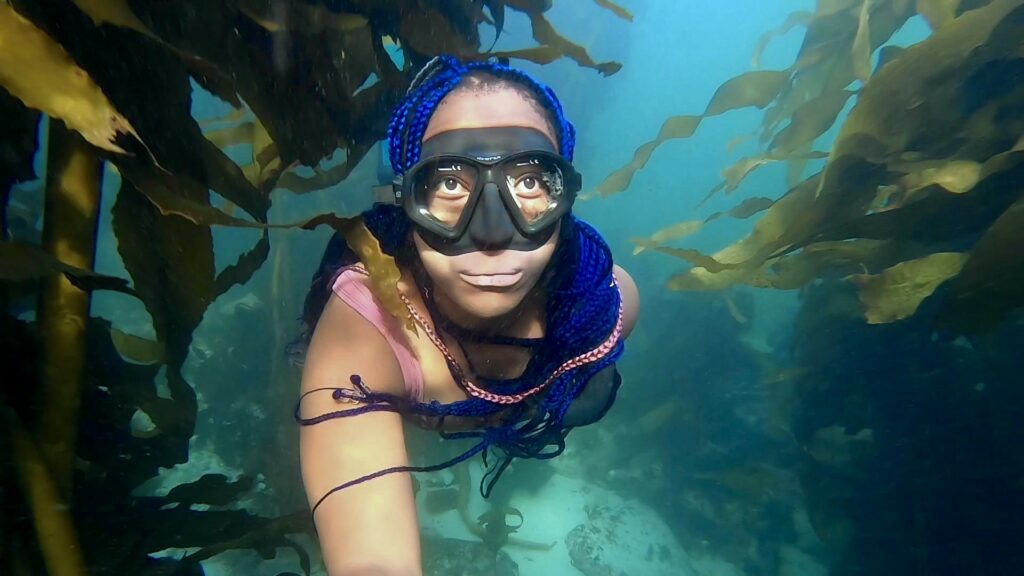
Last year she also made the BBC’s list of 100 inspiring and influential women from around the world, alongside names such as Michelle Obama, Amal Clooney and Gloria Steinem. All the positive attention is making Zandile aware that a ticking clock is the main challenge she faces.
“It’s about having enough time to get to all the passion and purpose work,” she says. “2022 and 2023 brought a learning of how finite time is and how I’m just one human.
“This made me realise the need for finding grants to help keep the Black Mermaid Foundation’s work running consistently, and building a team that can focus on our work even in my absence.”
A grant from Zandile’s work as 11th Hour Racing ambassador has helped in this regard. “The focus is definitely on having clarity about what needs to be a priority – saying ‘no’ a little more and finding time to play helps restore my energies.” Follow her activities on Instagram, TikTok or X.
Zandi’s Song
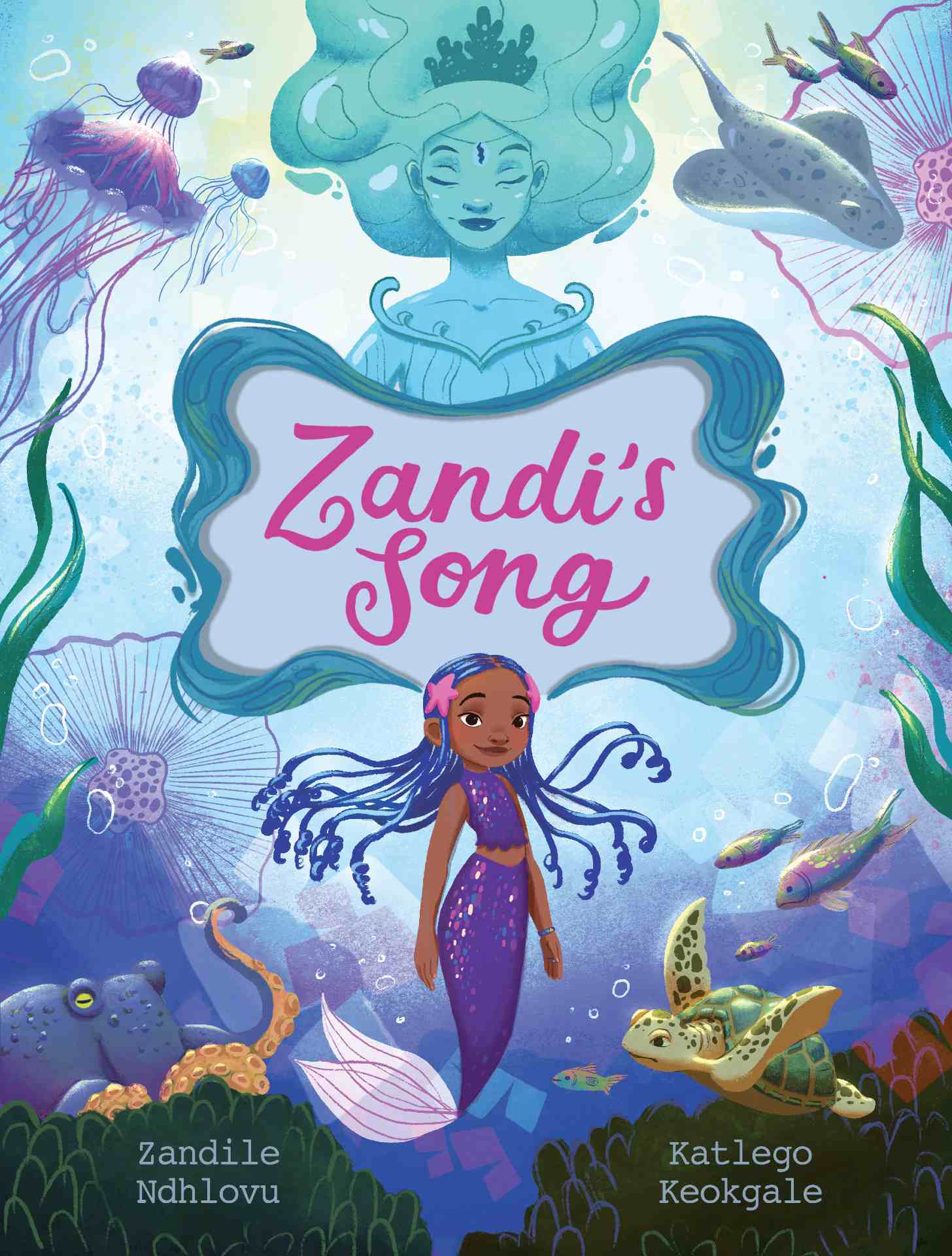
Zandile Ndhlovu has written a semi-autobiographical book for children aged 6-8 and it was published in late March.
Zandi’s Song is the story of an effervescent blue-haired mermaid from South Africa on a mission to protect the planet’s oceans and connect young people – especially people of colour – to the seas.
Illustrated by Katlego Keokgale, the 32-page hardback book is available on Amazon for £11.47 (ISBN: 9781662520105).
Also on Divernet: Diving blind: How Jess Pita experiences the underwater world, PADI & SSI use socials to spread diving word, Scuba is meditation for new AmbassaDiver, Miranda K joins AmbassaDivers team
